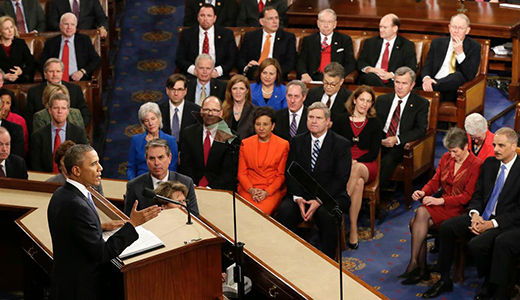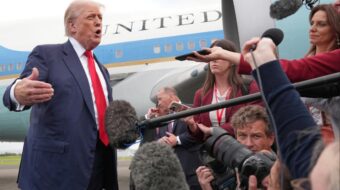
President’s Obama’s State of the Union address included a welcome centerpiece proposal taxing finance capital and the rich, and giving it to the middle class and poor. Personally, I view it as the return of stolen wealth, not a gift. But as long as the check is good, I don’t care what it’s called.
The president is drawing on a revival of “inclusive capitalism” theory in economics. This is not exactly a new theory, but it is receiving a lot of attention now. A cluster of policy initiatives and inclusivity debates in mainstream economics has arisen in response to the impact of major inequality. Those debates are also not new. They include a lot of work by Joseph Stiglitz, Paul Krugman, Daron Acemoglu, and others. But the debate has taken center stage since the publication of Thomas Piketty’s “Capital in the 21st Century.” Indeed, Jason Furman, the current chairman of the president’s Council of Economic Advisors, was quite frank about this in a major speech on “Inclusive Growth” delivered last May at the Institute of International and European Affairs (IIEA) in Dublin:
“One of the useful contributions of the much-discussed new book by Thomas Piketty, ‘Capital in the Twenty-First Century,’ is to highlight that there are other important sources of inequality that derive from capital rather than labor.”
Furman goes on to endorse one of Piketty’s fundamental conclusions, namely, that aggravated inequality will adversely affect both growth and stability. Further, he supports tax and income remedies in line with Piketty’s framework. Not only Furman, but also former Treasury secretary Lawrence Summers and Ed Balls, a British Labor Party politician, argue that inequality and a lack of financial resources among those in the bottom half of the income distribution will result in too little spending to keep gross domestic product at or near its capacity. “Developed nations,” they write, “need new social and political institutions to make 21st-century capitalism work for the many and not the few.”
“Inclusive capitalism,” according to Summers and Ball, seeks “to make our economic system more equitable, more sustainable and more inclusive.”
While some have said “inclusive capitalism” can be dismissed as “leftover new-Keynesianism” – as if one person in a hundred thousand would really know what that phrase meant – the core proposals are entirely consistent with what I will call “anti-monopoly” economics. And, as far as anyone can tell, anti-monopoly economics is at least half way to socialist economics – even if it is also true that it “saves” capitalism, and all of us too, from another collision and catastrophe like 1914-1945.
I will have more to say about the relationship of “anti-monopoly” economics to “socialist economics” in a later column.
“Inclusive capitalism” proposals would substantially alter the rules of the marketplace and the legal status and liability of “too big to fail” corporations. These include major revisions of the tax code to:
- Tax both wealth and income.
- Pass legislation to pressure corporations to increase pay to match productivity growth.
- Expand refundable tax credits to include low-income workers as well as households making as much as $80,000 a year.
- Expand retraining and transition subsidies, including free education, to raise human capital, and human consuming, capacity.
- Greatly increase public infrastructure investments in both human and physical capital.
- Undo corporate “personhood.”
- Expand labor rights.
- Reform corporate law to include stakes of public, environmental and employee interests and composition in boards of directors, especially of “too big to fail” firms.
Maryland Congressman Chris Van Hollen has further developed specific tax ideas along these lines.
Mark Carney, the Canadian governor of the Bank of England, articulated a fundamental premise of inclusive capitalism: “Just as any revolution eats its children, unchecked market fundamentalism can devour the social capital essential for the long-term dynamism of capitalism itself.” Among the attendees: Bill Clinton; Eric Schmidt, executive chairman of Google; and Summers.
Put in strictly “political economy” terms, “inclusive capitalism” is really less capitalism and more socialism, less market fundamentalism and more industrial policy, i.e., planning.
Some, both on the right and left wings of the Democratic Party, and the socialist left as well, have objected that the tax proposals were just presidential hot air given Republican control over both houses. Of these, the ones who were counseling Obama to shut up and go away, to kowtow to “debt and austerity” economics, or boondoggles like Keystone XL, or a more militaristic foreign and military policy prior to the elections, mostly got their clocks cleaned in the midterms.
On the left, some forces feel comfortable damning the president with faint praise for his economics. But mass movements – women, labor, African American, Latino – responded overwhelmingly favorably. That’s because, I believe, they know, as does Obama, that the stage on which working people must contend will be the next national election. This Congress will do nothing good. We will be lucky indeed to survive it intact. The president identified the key link that, if we grasp it, can pull the chain to the future. I believe he is correct.
There are splits remaining – important ones – on trade and foreign policy. However, I submit that from a working class point of view both of these areas are very divisive. If we strategically focus on them, we will be fighting our natural and necessary allies more than our real enemy. Why are they divisive? Because you cannot easily isolate the multinationals’ and billionaires’ wealth in the trade and foreign policy debates. That’s where we have to focus. That’s where the billionaires are vulnerable. That’s where unity can be forged. The question of wealth and income is the key to both national and international democratic and working people’s unity. It is the question everyone in every continent can understand. The 19th – and early 20th – century paradigm of imperialism and anti-imperialism is not a sufficient, is too simplistic a foundation for either understanding or constructing a new trade, or foreign, policy in a globalized world. I submit both trade and foreign policy will be an incomparably easier task to resolve differences if unity on inequality is achieved.
As I said at the opening, I don’t care if the president or his advisors call it “inclusive capitalism.” I am going to support the reforms as important components in “anti-monopoly democracy.” To those who say it’s pie in the sky: Well, it is true I do not believe Bill Gates can bring this into being. But we can! Sí se puede!
Photo: President Obama delivers his State of the Union address on Capitol Hill in Washington, D.C. | AP










